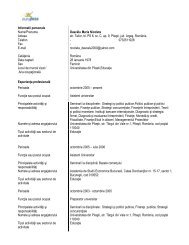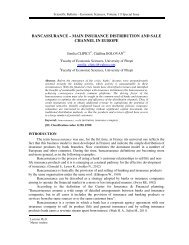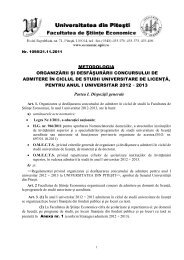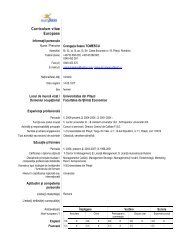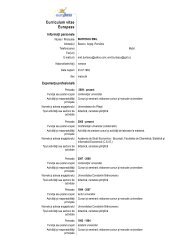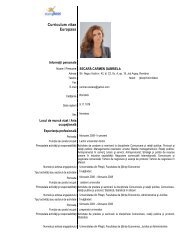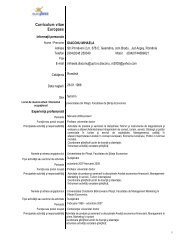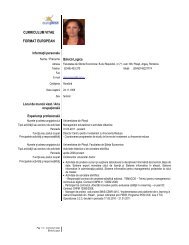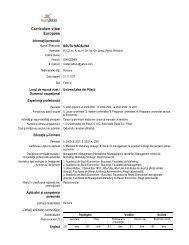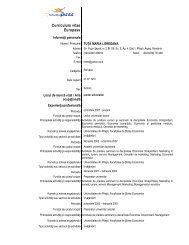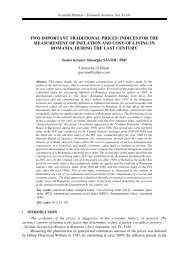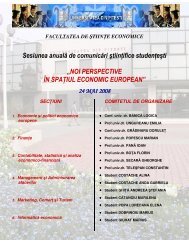buletin Åtiin ific - Facultatea de Stiinte Economice - Universitatea din ...
buletin Åtiin ific - Facultatea de Stiinte Economice - Universitatea din ...
buletin Åtiin ific - Facultatea de Stiinte Economice - Universitatea din ...
- No tags were found...
Create successful ePaper yourself
Turn your PDF publications into a flip-book with our unique Google optimized e-Paper software.
The role of training, coaching and mentoring in career <strong>de</strong>velopmentare based on the belief that managerial competence and un<strong>de</strong>rstan<strong>din</strong>g can be bestachieved through study and discussion of a certain events. Games role - participants draw up a statement by assuming the roles of the charactersinvolved. The situation is that there are interactions between 2 persons or within a group.Each participant shall give written directions and are largely explains their role in thegame. The game of role is used to give managers, heads of <strong>de</strong>partments responsible forsales and the possibility of applying real situations that interview, the management team,keeping of meetings, counselling, meeting the performance evaluation. Simulation - the method of training that combines case studies and role-play to gain amaximum of realism. The goal is to assimilate more easily what it has been learned byreproducing situations that are most close to real life. Participants have such opportunityto exercise behaviour in i<strong>de</strong>ntical or similar to those that they will encounter in theirwork. Workshops - are a group of people gathered particular, with which a person examinecommon problems in the organization.In Romania is spent on average 92 euro per year per employee on training, motivational andteambuil<strong>din</strong>g activities. There are companies which allocated amounts ranging between 150-200euros / year / employee and multinational companies provi<strong>de</strong> a budget for training all employeestwice a year which represents 1% of turnover. Big companies allocate an average of 1000-1500Euro / 1 day training. The structure of a budget <strong>de</strong>velopment staff inclu<strong>de</strong>s:- 50% of the budget is earmarked for technical training;- 30% for the training of "soft skills";- 20% incentive programs (with important role in motivating employees).Training activities contribute to increase the implication of the employees and the<strong>de</strong>velopment of their business, with direct effect on growth performance.Coaching and mentoring as a method of <strong>de</strong>velopment processes are staff training andassessment offered by the supervisor of employees who are immediately above in the hierarchy,so that an effective coaching could have an open relationship between employee and manager(supervisor). Supervisor is seen as a coach for the "player" that came to his team, or as a mentor(guardian) for "the protégé" or, in both cases the aim is the integration and assimilation easytasks and streamline business post. Human resources management in the two notions are oftenused interchangeable, although there are some differences between them. Mentoring istraditionally focused on long-term, has more extensive problems and needs generated by theorganization. Coaching is focused on short-term and focus on spec<strong>ific</strong> tasks, taking into accountprimarily individual needs.3. The mentoring methodThe mentor 39 is the person who encourages, supports and advises the employee in theevolution career. At the same time, he gives it practical assistance to ensure that are able toachieve the objectives of professional and personal <strong>de</strong>velopment. The activity of mentoring ormentoring completed training of employees in the workplace, as a very good acquisition of skillsand knowledge of a spec<strong>ific</strong> post.The mentor 40 can be <strong>de</strong>fined as a senior and a higher position in the organization that gives ayoung person a special situation, giving them advice and creating the opportunities.39 www.careerexperts.ro;40 Gary Jones: „Organizational behavior”, Economic Publishing House, Bucharest, 1998, pg. 573 – 575;102



